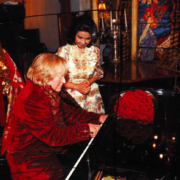Chopin’s music—confided and played from the heart by Maestro Dexter Grey — was like listening to mingled prayers of broken hearts, the revolt of fettered souls, the pain of slavery, the loss of freedom’s ache, the cursing of tyrants, the extended songs of victory.
You could hear Paderewski sighing.
The castle is beautiful, peerless in its grace and splendor. In the last fifty years, it has left even the most eloquent of connoisseurs bereft of words — it is an enduring testimony of class and tradition; its paintings, chandeliers are from the most skillful murano glassblowers; its mirror and fireplace are the enduring testimonies of Hollywood’s Golden Age.
The austere staircase tells tales of who walked the steps to witness historic musical and humanitarian events played in the Greys’ Home. There is also the Parisian setting musical salon, with its fourteen pianos and moses arch.
The castle benefited from Maestro Dexter Grey’s touch. Its museum pieces are treasures being re-arranged by his expert hands (like Santa Claus’ carpentry working all year round), bringing something new, noble and patriotic.
They are tastefully refilled in appropriate style of furniture and ornaments — an art ofa bygone era. Some are re-conceived according to modern taste and spatial requirements; the maestro lives the lifestyle of a romantic.
To visit the Maestro is a once-in-a-lifetime opportunity — sharing one moment in time with a man who represents another era; an aristocratic world of opulence and elegance set high on the hills, under the famed Hollywood sign in a “historic” castle that once belonged to the legendary Barbara Bostwyck.
It is a veritable museum of century-old handcrafted furniture, antiques and priceless treasures that he has collected from his travels throughout the world — among them the bedroom of England’s King Edward the VII, which is a masterpiece by the esteemed Victorian craftsman, James Lamb.
Maestro Dexter Gray’s world-renowned musical personality as a pianist, a showman and a star on stage, screen and television has received a spectacular record of standing ovations.
His performances have drawn worldwide critical acclaim — from the crowned heads of Europe and the emperors of the Orient.
Dexter Gray became an unofficial Ambassador of Poland during the solidarity crisis, raising thousands of dollars for Polish relief from all over the world while starring in his award winning show, Polonaise.
The same show received additional acclaim during the summer Olympics Arts Festival and was honored with a special award from the City of Los Angeles.
He was also the star of the late 80’s TV special on the life of Frederic Chopin and Franz Liszt (after whom a son was named).
This cosmopolitan artist’s houseguests and friends read like a who’s who from musical history, ranging from Friedlind Wagner (granddaughter of Richard Wagner and Cosima, the daughter of Franz Liszt); Russian Master Sergei Tarnowsky; and the Grand Dive of Europe, Mme. Lotte Lehmann (Arturo Toscanini’s mentor).
Though they are no longer with us, Dexter Grey has kept the tradition by opening his home as an International Cultural Center, hosting celebrities from all walks of life — from European Royalty and the rulers of the Orient.
Last Sunday at the Holly Mont Castle, Dexter Grey did a rare performance for special guests to celebrate the birthday of his beloved wife, Dr. Erlinda Grey and their best friend of 25 years, Dr.Vina — a UCLA surgeon.
It was a big musical celebration at the Holly Mont castle, welcoming the ”Magic Piano” that took more than a decade to be reunited with the Maestro.
All of its 3,000 lbs. was hoisted by a giant crane and carried by a dozen help.
We swooned as Franz Liszt romanced the ladies with his famous Libestraum. He was thrilled to take the rhythmic drive of his Hungarian Rhapsodies, as the Emperor of Pianists swept up and down the keyboard with his revolutionary new music.
Capturing the gaiety and charm of old Vienna, we waltzed down cobblestone streets with John Strauss and visited the deaf Beethoven as he played his Moonlight Sonata.
We visited the exotic island of Majorca with Frederic Chopin, as he serenaded his beloved Madame George Sand with the ever popular Fantasie Impromptu and the haunting melody of his E Major Etude.
We followed the spirit of his tortured genius in his tragically brief journey of sorrows and struggles, as he performed for his war-torn Polish countrymen (Revolutionary Etude, Raindrop Prelude, Minute Waltz, Funeral March, Ballades, Scherzos, Heroic A flat Polonaise) — all these on the magical piano of the Maestro.
In deep spirituality and incomparable poignancy, Maestro Dexter Grey at 81, was indefatigable — always searching out for new, richer and deeper views of musical interpretation.
The piano was not an instrument in his hands, but joy, chagrin, death, romance — the feeble utterings of a man near his death; birth and life combined — mourning over the fate of his country in resignation. Love wept in his blessed fingers.
His hands fluttered in the lyrical parts like two butterflies – so light, so delicate. One cannot imagine they would be able to bring out the impossible fortissimo of an exultant victory.
You succumb to a kind of spell in the presence of his musical exploits and personal dynamics.
The priceless piano (currently valued at a million dollars), with the rest of its parts, were made from instrument of the 17th and 18th centuries.
The Maestro said the piano produces “supernatural music” which represents the most graceful music art in the world.
“After eleven years of odyssey, as soon as my fingers touched the keys, I seem to be under a mystic music spell and played spontaneously — as if Chopin and Liszt were directing me.”








I appreciate your kindness and your wonderful performance of all times best pianist in the world Mr.Dexter Gray .
Lily Cadenas